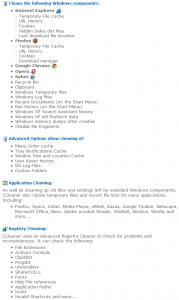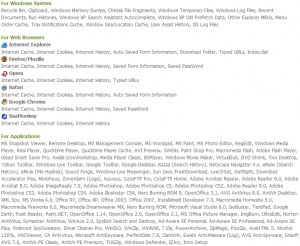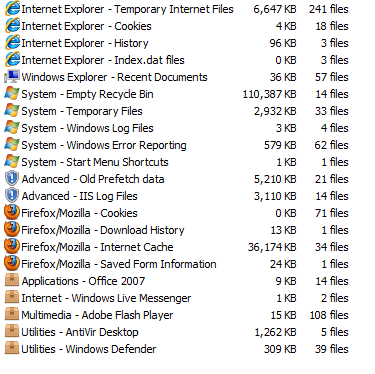Everyone, everyone, knows about CCleaner. On the other hand, many of us don’t know about FCleaner. FCleaner is similar program to CCleaner; I ran across FCleaner some time ago but didn’t give it much thought. However, recently Giovanni, a friend, challenged CCleaner by claiming FCleaner is… better. So, time to have a throwdown.
In the right corner we have the popular and trusted CCleaner – a veteran in the field of privacy and registry cleaning. In the left corner there is the (relatively) new, but exciting, FCleaner which specializes in privacy cleaning. Ready? Fight!
Features
CCleaner cleans
Additionally
- Users may use CCleaner’s advance INI customization or “Include” feature (found under Options) to make CCleaner clean applications/files/folders that are not supported by CCleaner by default.
- CCleaner has ability to wipe free space.
- CCleaner has a simple startup manager (enable/disable/remove).
- CCleaner has a simple uninstaller.
- CCleaner can remove system restore points selectively.
- CCleaner allows users to specify certain cookies, files, folders and registry entries to not be deleted when CCleaner runs.
- CCleaner has secure deletion options.
FCleaner cleans
Additionally
- Users may use FCleaner’s “Custom Cleaner” feature (found under Options) to make FCleaner clean files/folders that are not supported by FCleaner by default.
- FCleaner has a simple startup manager (enable/disable/remove).
- FCleaner has a simple uninstaller.
- FCleaner allows users to specify certain cookies to not be deleted when FCleaner runs.
- FCleaner has secure deletion options.
- FCleaner has “quick links” to Windows components: Security Center, System Restore, System Information, Command Line, and Task Scheduler.
As you can see, generally speaking, CCleaner and FCleaner have similar features. The major differences are as follows:
- While FCleaner does remove registry entries as needed (i.e. if one of the thing it is cleaning involves cleaning registry entries it will do it) but FCleaner does not have a specific registry cleaner like CCleaner does.
- CCleaner can wipe empty space.
- CCleaner supports Unicode while FCleaner does not. Thanks Farrukh!
Performance
When it comes to privacy (and registry) cleaning it is performance, rather than features, that makes or breaks a program. So let me break the suspense and tell you CCleaner is still the gold standard – FCleaner effectively “broke”.
What I did was enable all privacy cleaning features for both programs (I did not use CCleaner’s registry cleaner since FCleaner does not have a comparable feature) and scan my computer with both. Here are the results:
CCleaner
As you can see, there are obvious discrepancies so I investigated. My conclusion: FCleaner needs a lot of work. Here are the major discrepancies that I noticed: not only did FCleaner totally miss Firefox’s cache but it is also detecting cookies for Chrome and Opera and saved passwords for Chrome. That is insanity because my Firefox’s cache is obviously large and is essential to delete for a privacy cleaning software and I don’t have any cookies in Chrome or Opera nor do I have any saved passwords in Chrome – I triple checked to make sure.
To be fair, FCleaner did scan a tiny bit faster than CCleaner and did offer to clear some minor things which CCleaner did not, such as WindowsUpdate.log (although many people may not want to clear their WindowsUpdate.log). Also, FCleaner does not come with Yahoo Toolbar like CCleaner does (there are non-toolbar versions of CCleaner though).
Overall, however, CCleaner is still king. Sorry Giovanni.
You may download CCleaner and/or FCleaner from the following links:
CCleaner
Version reviewed: v2.25.1025
Supported OS: Windows 98/NT4/ME/2000/XP/2003/Vista – it also works on Win7 fine for me.
[Direct download – non-toolbar version]
[Direct download – portable version]
FCleaner
Version reviewed: v1.2.6.1102
Supported OS: Windows 9x/ Me/2000/XP/2003/Vista/Win7

 Email article
Email article







